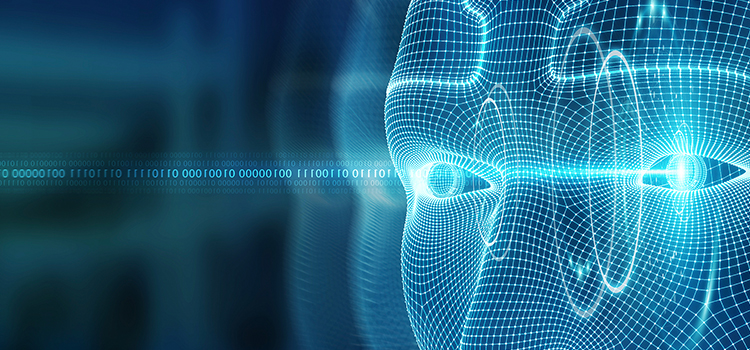3 min read

WILL MACHINES TAKE OVER FROM MARKETING?
There’s been an upsurge in nervousness from marketers in the space of a year. With the explosion of artificial intelligence and machine learning, will machines take over the marketing department entirely?
We’ve seen the scenario across the board in so many sectors – from heavy industry to customer services: automation has been systematically removing the need to employ actual humans for an increasing number of tasks. Brinker & Baldwin’s Martech 2030 borrows from Warren Bennis when they say the marketing department of the future will have only two employees: a human and a dog. The human will be there to feed the dog. The dog will be there to keep the human from fiddling with the marketing automation software…
Will machines take over from marketers? RR Donnelley’s Pivot Report 2020 found that marketers seem to think so, with 59% of them worried that AI and machine learning will limit their personal growth — quite a jump from only 14% in 2019.
What’s the reality?
Martech2030 studies Five Trends in Marketing Technology for the Decade of the Augmented Marketer, where Trend #5, Harmonizing Humans & Machine, sets out several use cases to put the marketing mind at rest. Three of these are below, to which Aaron Bean, MOI VP Strategy, Americas, has added his take. Even so, there’s a stark warning to any marketer thinking that a rested mind means resting on their laurels…
Modelling
The report acknowledges that there’s little doubt certain marketing tasks are performed faster and more efficiently using AI and ML-powered software. For example, AI-driven approaches can do a much better job of analysing the plethora of data needed to optimise the likes of multivariate testing or ad spend.
But the authors are quick to point out that the modelling and the data sources that feed them are still largely determined by humans.
MOI’s Aaron Bean agrees: “The side of AI most people don’t talk about is that most AI technologies today are only as good as the data, and often the implicit bias used to train the predictive models. While AI is very promising and worth testing now, it’s not a silver bullet. If you accidentally trained autonomous vehicles to recognise sidewalks as roads, the disadvantages would certainly outweigh the positives! Put in flawed data and you may get less than ideal outcomes.”
Humans, unlike software, are able to adapt on the fly, consider factors outside the data model, find solutions when they break, remove unintended bias and create new or revised models.
So rather than AI removing the need for marketer involvement, their involvement will be more important than ever. As Aaron puts it: “these skills will become even more critical as marketers and the businesses they represent continue to rely more heavily on machine generated recommendations and predictions.”
Strategy
There’s a limit how far automation goes before human perspective and judgment need to take over. An explosion of data and insights from a myriad of different sources need to be analysed and translated into a strategy, and in turn that strategy needs to be translated into actionable programs. Being able to apply those skills effectively already requires considerable talent from senior marketers, but the need for critical assessment and analytical skills will only grow as the decade continues to present wave after wave of new technologies.
Creativity
AI and Machine Learning technologies that can turn a doodle into a design or create optimised email copy are already out there, and getting smarter all the time. It’s the creative equivalent to “no code” development.
But pure creativity isn’t something that data represents well. By its very nature, creativity needs uniquely human qualities: imagination, empathy, intuition, curiosity, collaboration, moral and ethical judgment, and much more. And great marketing resonates profoundly with culture, with its complex dynamics of psychology, society, and contextual human experience.
So it’s hard to see a role for AI in creativity beyond basic tasks that traditionally involve time, legwork and cost for humans.
But Aaron believes its role has the potential to go much further: “AI will enable us to be more creative, to accelerate the creative process, to iterate and envision faster, across a wider range of possible scenarios”. He goes on to explain: “Trained and tuned properly, over time and with increasing volumes of data linked to business outcomes, AI technologies – already seen in the likes of Snazzy.ai, will breathe fresh air into the creative process, often working to help us leapfrog existing creative solutions, get prototypes into market faster, and shorten the learning cycle time to see the best possible creative solution.”
So are we going to see a robot takeover?
That’s unlikely. Across the board, the truth is that as technology advances, marketers will be able to take advantage of AI to free up their time, develop their skills and knowledge, and focus on their uniquely human contributions to the business.
According to Martech 2030 – and we certainly don’t disagree – harmonising the collaboration between humans and machines will be one of the most exciting and innovative aspects of marketing over these next ten years. It will introduce new complexity to marketing’s environment, but marketing software will evolve to help manage that complexity. It will be the age of the “augmented marketer”.
But this optimism comes with a warning. The report starkly points out that the only way machines will take your job in marketing, is if you fail to keep up with how to use them.
Related content








